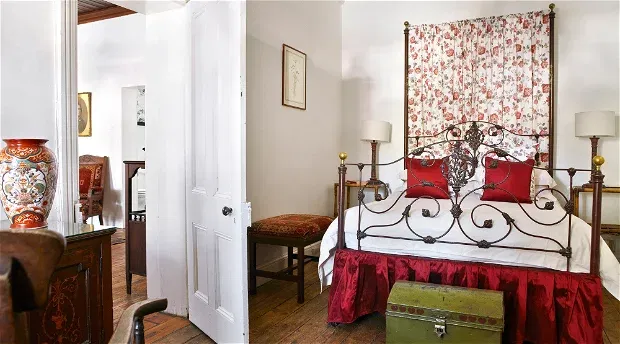At The Lord Milner Hotel in Matjiesfontein, our team recently embarked on a 125 km transhumance trek with a local Karoo sheep farming family, gaining deep insight into the heritage behind our beloved Karoo lamb. This time-honoured journey through the rugged landscape, marked by resilience, tradition, and connection to the land, revealed the true soul of the Karoo and the people who sustain it. Now, every dish of Karoo lamb we serve...
Olive Schreiner

Olive Schreiner (1855–1920) is remembered as one of South Africa’s most influential literary figures and a pioneering feminist. Her works and activism during the late 19th and early 20th centuries left a lasting impact on literature, politics, and social reform in her home country and beyond.
Olive Schreiner: A Pioneering Voice in South African Literature and Feminism, with Roots in Matjiesfontein
Olive Schreiner (1855–1920) is celebrated as one of South Africa’s most influential literary figures and a pioneering feminist. Her works, activism, and connection to places like Matjiesfontein—a small village in the heart of the Karoo—left a profound impact on South African literature, politics, and social reform.
Early Life and Influences
Schreiner was born in the Eastern Cape to missionary parents and grew up in a large family with little formal education. Yet, her experiences living in South Africa's rural landscapes shaped her worldview, giving her insight into colonial life and its challenges, particularly for women and indigenous populations. This early exposure to inequality would go on to deeply influence her writing and activism.
Schreiner’s move to England in her early twenties allowed her to pursue writing seriously. While working as a governess, she penned The Story of an African Farm (1883), published under the pseudonym Ralph Iron. This novel became a landmark in South African and feminist literature.
The Story of an African Farm: A Revolutionary Novel
Set on a remote South African farm, The Story of an African Farm grappled with existential and societal questions—gender roles, personal freedom, spirituality, and social justice. It challenged the Victorian-era norms of its time, particularly with its portrayal of strong, independent female characters like Lyndall, who rejected the expectations placed on women in society.
This novel, considered groundbreaking in both its themes and style, made Schreiner one of the first South African writers to gain international recognition.
Schreiner and Matjiesfontein
In the early 1890s, Olive Schreiner moved to the small Victorian-era village of Matjiesfontein, a remote settlement in the Karoo established by James Douglas Logan. Known for its bracing air and as a haven for intellectuals and political figures, Matjiesfontein became an important place of refuge and inspiration for Schreiner.
During her time in Matjiesfontein, Schreiner continued her writing and political activism, drawing from the quiet isolation of the Karoo landscape. Matjiesfontein, with its unique mix of colonial charm and stark wilderness, provided the perfect setting for her contemplative nature. Here, Schreiner worked on several manuscripts and engaged with key political figures of the day, including Cecil John Rhodes, whom she critiqued for his imperialist policies.
Schreiner's residence in Matjiesfontein also added to the village’s growing reputation as a cultural and intellectual hub. Her presence in the town further linked the quiet Karoo village to larger conversations around feminism, colonialism, and the fight for justice in South Africa.
Feminist and Anti-Imperialist Activism
Schreiner’s feminism was not confined to her literature. She was an outspoken advocate for women's rights and racial equality. In her influential book Woman and Labour (1911), she argued for women’s economic independence and the right to work, which became a key text for the suffrage movement.
Her activism also extended to critiquing British imperialism and advocating for indigenous South Africans' rights, drawing connections between the oppression of women and colonial subjects. Schreiner’s time in Matjiesfontein, surrounded by the stark beauty of the Karoo, further solidified her commitment to social justice.
Legacy and Impact
Olive Schreiner’s contributions to literature and political thought continue to be felt today. Her writings, particularly The Story of an African Farm, laid the groundwork for feminist literature, while her political essays championed equality across gender and race. Schreiner's connection to Matjiesfontein remains a significant part of her legacy, as the village represents a period of personal reflection and activism in her life.
Visitors to Matjiesfontein today can still feel the echoes of Schreiner’s influence. The town’s historical charm, combined with its association with influential figures like Schreiner, makes it a significant stop for those interested in South African literary history. Schreiner’s home in the village, now preserved, offers a glimpse into the life of a writer who left an indelible mark on the cultural landscape of the country.
Conclusion
Olive Schreiner's legacy as a pioneering feminist, anti-imperialist, and literary giant is closely tied to places like Matjiesfontein, where she found the solitude and inspiration to continue her work. Her bold critiques of society, advocacy for justice, and remarkable literary achievements have ensured that her voice continues to inspire those fighting for gender equality, racial justice, and personal freedom in South Africa and beyond.
Further Reading
“Love is more than a noun – it is a verb; it is more than a feeling – it is caring, sharing, helping, sacrificing.” – William Arthur Ward





Share This Post